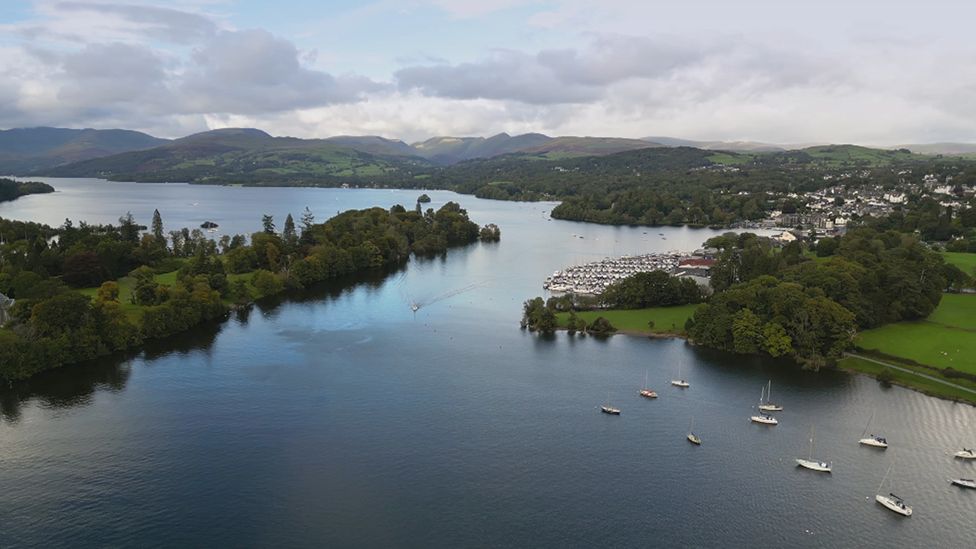ARTICLE AD BOX

Raw sewage was pumped into Windermere for more than three hours in June 2022
By Joe Crowley
BBC Panorama
Water companies can make sewage pollution disappear from the official figures, a BBC Panorama investigation has revealed.
Leaked documents suggest one firm, United Utilities, wrongly downgraded dozens of pollution incidents in north-west England last year.
The Environment Agency signed off all the downgrades without attending any of the incidents.
United Utilities denies misreporting pollution.
Water companies in England are set environmental targets by the regulator, Ofwat. One of the key benchmarks is the number of pollution incidents per 10,000km of sewer. These are typically sewage discharges into rivers or the sea, caused by blockages or equipment failure.
The companies have to pay fines if they exceed a given number of pollution incidents, and are given financial rewards if they come in below.
Image source, Ashley Cooper/Science Photo Library
Image caption,Raw sewage mixing with clean clear water
According to the Environment Agency's figures, United Utilities was the best performing company in England in 2022. It recorded just 126 pollution incidents, or 16/10,000km of sewer.
As a reward for this good performance, the company will be allowed to raise £5.1m by increasing bills for its seven million customers next year.
But whistleblowers at the Environment Agency claim the company has been wrongly downgrading pollution incidents and that the agency is failing to conduct independent checks.
One insider told Panorama that United Utilities was "controlling the evidence" on pollution.
When pollution incidents are reported to the Environment Agency, it assesses the potential impact and decides whether to attend.
From 2020 through to the end of 2022, there were 931 reported water company pollution incidents in north-west England, and the Environment Agency only attended six.
"If they [United Utilities] say attend - which is incredibly rare - we'll attend," said the whistleblower. "If they say don't attend, we don't attend. They're effectively regulating themselves."
Water companies are dumping huge quantities of sewage in UK rivers every year. So why do some of the worst offenders have such good environmental ratings? Joe Crowley investigates.
Panorama has obtained 200 reports about pollution incidents at United Utilities' sewage works in 2022.
In more than 60 of these cases, the company appears to have wrongly downgraded the incidents to the lowest level, category 4.
They were all signed off by the Environment Agency.
Category 4 incidents are not counted in published figures because they are supposed to have had no environmental impact. Only more serious categories 1-3 are counted.
The Environment Agency guidance says category 4 should only be used where either pollution doesn't get into the water course, or where it is of such insignificance that it doesn't have an impact, for example a "trickle into a large water course".
The incidents identified by the programme were all more than a "trickle" and appear to have had an impact.
Two experienced water pollution officers, who can't be identified because they work for the Environment Agency, independently reviewed the documents for Panorama. They agreed that none should have been classified as category 4.
If the 60 cases identified by Panorama were wrongly downgraded, then United Utilities should not have been awarded its £5m bonus for reducing pollution incidents last year.
One of the apparent cover-ups was in a World Heritage Site in the Lake District. In June 2022, a fault led to raw sewage being pumped into the middle of Windermere. The incident went on for more than three hours.
The leaked documents show it was initially thought to be a serious category 2 incident, but the Environment Agency didn't attend and United Utilities downgraded it to category 4.
Windermere is a World Heritage Site
The Environment Agency insider said it was a serious incident, and that a huge volume of polluted material had been pumped into a water body: "The water company don't want us to attend and then an incident like this gets downgraded to a low level or, effectively, gets kept off the books."
United Utilities initially denied that sewage had been pumped into the middle of the lake and said that tests conducted on the shoreline showed the pollution had no impact.
But company documents obtained by Panorama prove the sewage was discharged into the middle of Windermere.
Mark Garth, the company's director of wastewater treatment, told the programme: "I do accept that on this occasion sewage ended up in the lake as a result of that failure."
Another potential cover-up identified by Panorama was at the Wallasey pumping station on the River Mersey in Liverpool last November.
On this occasion, untreated sewage was released into a Site of Special Scientific Interest (SSSI) after the pumps stopped working for more than two hours.
Once again, the leaked documents show it was initially thought to be a serious category 2 incident, but the Environment Agency didn't attend and United Utilities downgraded it to category 4.
United Utilities says it is false to suggest it misreports pollution incidents and that the final categorisations are decided by the EA.
"We work extremely hard to get on top of pollution and we're extremely proud of our performance," said Mr Garth.
"We continue to do that and covering it up or misguiding the Environment Agency in any way is absolutely no part of that performance."
The company said the Wallasey incident was a category 4, because the pollution was diluted by the large volume of water in the Mersey and then the Irish Sea.
Mark Garth of United Utilities defends its record on pollution
The Environment Agency declined to be interviewed for the programme, but said in a statement that some monitoring of water companies could be done remotely.
"We take our responsibility to protect the environment very seriously," it said. "We respond to every incident and always attend those where there is a significant risk."
The agency said regulations were being strengthened and that it would soon have new powers to deliver civil penalties that are quicker and easier to enforce.
It is currently conducting its largest ever criminal investigation into potential widespread non-compliance by the water companies, including United Utilities.

 1 year ago
34
1 year ago
34








 English (US) ·
English (US) ·